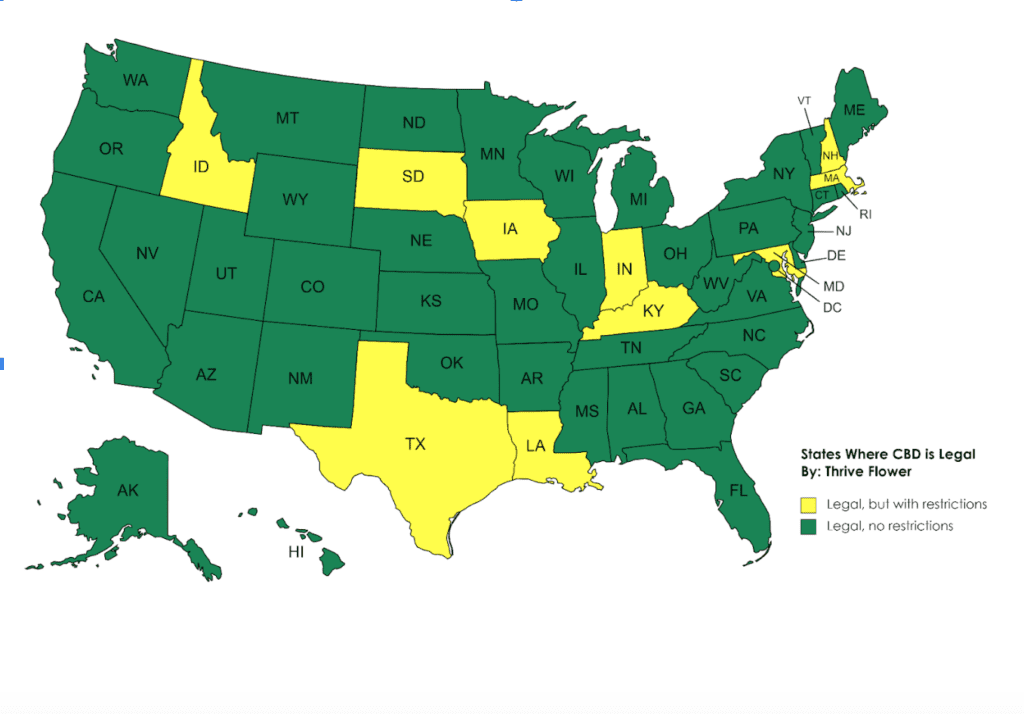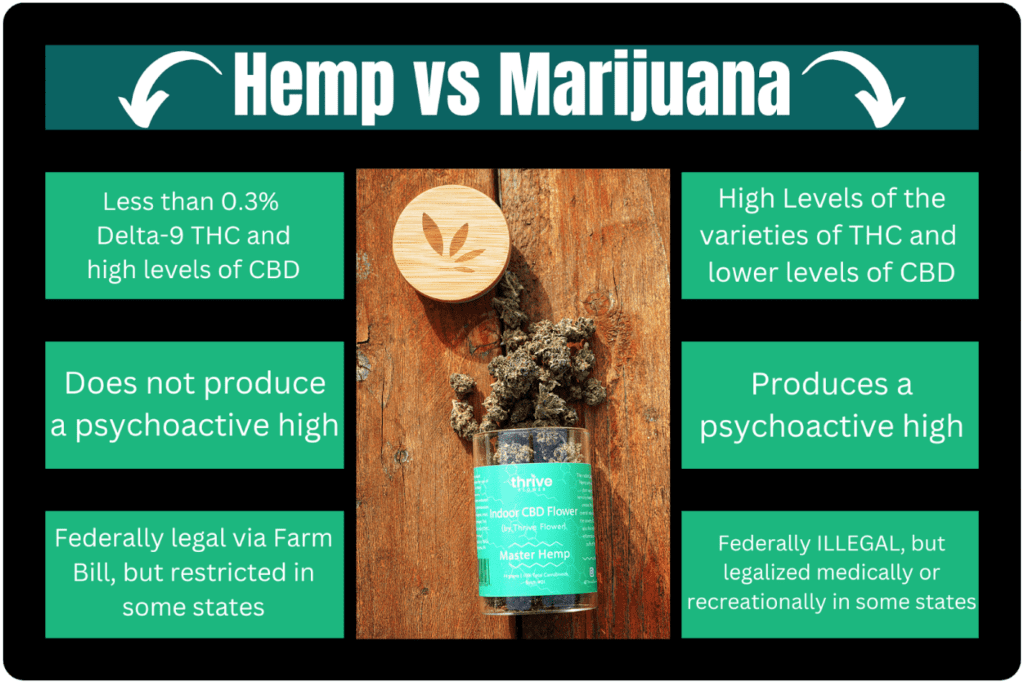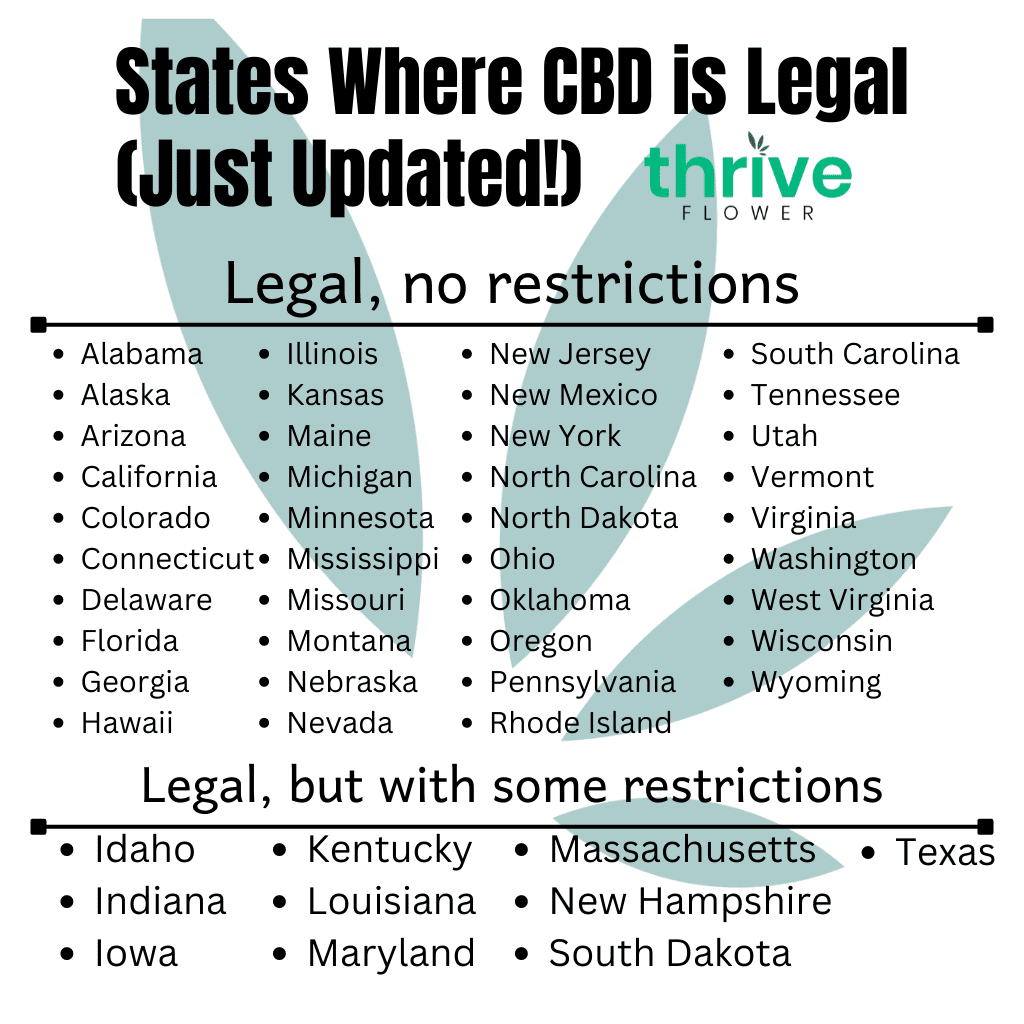Is CBD Legal in All 50 States?
Updated October 2022
Interested in trying CBD? It is new and exciting so it is common for people to question CBD before actually trying it out. People have different reasons for why they should use CBD for their personal wellness, but the one of the most commonly asked questions is “is CBD actually legal here in the United States?”
Short answer: yes it is federally legal, but there are a few restrictions in certain states.
CBD is 100% federally legal and safe to purchase, sell, and consume as a result of the passing of the Farm Bill (2018). The bill considers two factors to determine the legality of a product.
- The Source – CBD is found in both hemp and marijuana, but only CBD from hemp is federally legal
- Levels of Delta-9 THC – All hemp products must contain less than 0.3% Delta-9 THC.
The Farm Bill (2018) applies to the federal legality of hemp-derived CBD. It does not apply to marijuana. Marijuana is still federally illegal and not every state has passed laws allowing either the medical or recreational use of it. Some states have restrictions in place for certain types of hemp-derived CBD products like smokable hemp flower and edibles. Check the list at the bottom of this article for your state’s CBD laws and restrictions.

What is CBD?
CBD (cannabidiol) is a cannabinoid from the cannabis plant. Cannabis refers to both hemp and marijuana. CBD is found in both. Cannabinoids are the active parts of the cannabis plant and there are over 100 varieties of them.1 THC (tetrahydrocannabinol) is the most commonly known cannabinoid and this is the one responsible for the “high” feeling people get from using marijuana. There are many types of THC including Delta-9 THC, Delta-8 THC, and THC-A. Cannabidiol (CBD) has many similar benefits to those you may associate with mairjuana use such as: pain relief, anxiety relief, anti-inflammation, sleep aid, digestive health, mood booster, and more. All of this, but without the “high” feeling because CBD is non-psychoactive.

Hemp seed oil is another popular product type. It is important to note that CBD and hemp seed oil ARE NOT THE SAME. Hemp seed oil comes from (you guessed it) the seeds of the hemp plant. These seeds contain 0% CBD. So if you are looking for CBD, hemp seed oil is not it.
While some states have passed laws to make marijuana legal for medical and recreational use, it is not federally legal. CBD, while also from the cannabis plant, has a different set of rules the industry abides by. Let’s take a look at the legality of CBD and some of the restrictions in place.
The Legality of CBD (Is CBD Legal in All 50 States?)
The CBD movement had been gathering momentum when it really started booming with the passing of the The Farm Bill in 2018. This bill makes CBD legal to sell, cultivate, and consume on the federal level. The bill also makes a long awaited distinction between marijuana and hemp. Hemp is legally described as having less than 0.3% Delta-9 THC. At these levels of THC you will not experience any “high” feeling and you would be able to pass a drug test. All CBD products on the market are required to be derived from hemp, not marijuana.
In the past, cannabis has been strongly prohibited in not only the United States, but around the world. In the 1930’s, the U.S. began to campaign against the use of cannabis. It was said that cannabis use made you insane, aggressive, and a criminal (see Reefer Madness, a film from the 1930s). In 1970, marijuana was added to the Controlled Substances Act. It was only recently that the legal status of cannabis was revisited by lawmakers.
It is not very hard to find CBD products in the marketplace today in the United States. The industry is looking to bring in upwards of 20 billion USD in the coming years.2 Types of products include pain relief salves, lotion, muscle gel, vape pens, hemp flower, gummies, oil drops, and even pet products. To find high-quality CBD products, be sure to look for up to date lab results outlining the levels of Delta-9 THC and CBD. Certain types of CBD products have some restrictions on them in particular states. Let’s take a look at your state’s specific CBD and hemp laws.
Is CBD Legal in All 50 States? Your State’s CBD Laws

Ok, so we know hemp-derived CBD is federally legal as a result of the Farm Bill (2018).3 Even so, each state still can decide on their own the legality of CBD and any restrictions placed on certain products. In some states, smokable hemp flower is banned. In others, edible and drinkable CBD products may be restricted. The legality of hemp-derived CBD is different from marijuana-derived CBD, which is still federally illegal and changes from state to state. It is important to know each state’s laws to avoid any legal trouble. Here is a comprehensive list of the hemp-derived CBD laws in your state (including Washington DC):
Alabama
Hemp-derived CBD – Legal
Alaska
Hemp-derived CBD – Legal
Arizona
Hemp-derived CBD – Legal
Arkansas
Hemp-derived CBD – Legal
California
Hemp-derived CBD – Legal
Colorado
Hemp-derived CBD – Legal
Connecticut
Hemp-derived CBD – Legal
Delaware
Hemp-derived CBD – Legal
Florida
Hemp-derived CBD – Legal
Georgia
Hemp-derived CBD – Legal
Hawaii
Hemp-derived CBD – Legal
Idaho
Hemp-derived CBD – Legal, but with restrictions
Idaho, like all other states, restricts CBD products by the levels of THC. The difference with Idaho is that their limit is 0% on all types of THC. Many other states set the limits according to the Farm Bill at 0.3% Delta-9 THC. This means that, in Idaho, you can only purchase products made with CBD isolate.
Illinois
Hemp-derived CBD – Legal
Indiana
Hemp-derived CBD – Legal, but with restrictions
Indiana allows the cultivation, production, sale, and consumption of hemp-derived CBD as long as the THC percentage is below 0.3%. As per Senate Bill 516, this legalization does not include smokable hemp which carries a “criminal penalty for dealing, manufacturing, financing, or possessing”.10
A federal Judge threw out the ban on smokable hemp. He called it “unconstitutional” to ban just one type of hemp product only because law enforcement has not adapted to federal law and found a sufficient way to distinguish hemp from marijuana.
To summarize, hemp-derived CBD is legal in Indiana, but smokable hemp products are a bit of a gray area.
Iowa
Hemp-derived CBD – Legal, but with restrictions
Hemp-derived CBD products are legal under Iowa law, except for smokable hemp. Hemp for the purpose of inhalation remains illegal in Iowa.6
Kansas
Hemp-derived CBD – Legal
Kentucky
Hemp-derived CBD – Legal, but with restrictions
Kentucky state laws follow federal guidelines set forth by the Farm Bill (2018), but there is a ban on smokable hemp flower. The Kentucky Department of Agriculture clearly states that is it “illegal to possess hemp leaf”.11
Recently a bill was introduced to overturn the ban on smokable hemp products, but it has not made much progress as of March 2020.12
Louisiana
Hemp-derived CBD – Legal, but with restrictions
Louisiana allows the production, sale, and consumption of hemp-derived CBD products, but with restrictions on smokable, drinkable, and edible products.13 The bill states that “no person shall process or sell any part of hemp for inhalation, any alcoholic beverage containing CBD, any food product or beverage containing CBD”.
Maine
Hemp-derived CBD – Legal
Maryland
Hemp-derived CBD – Legal, but with restrictions
The Maryland Department of Health has stated that CBD products are legal as long as they are below 0.3% Delta-9 THC. It has also stated that edibles and beverages remain illegal. It is “unlawful under the Food Drug and Cosmetic Act to introduce food containing added CBD or THC into interstate commerce, or to market CBD or THC products as, or in, dietary supplements, regardless of whether the substances are hemp-derived.”*
Massachusetts
Hemp-derived CBD – Legal, but with restrictions
Massachusetts allows the sale and use of hemp-derived CBD products, except for edibles and beverages. “The Massachusetts Department of Public Health (DPH) regulates food manufacturing in the Commonwealth (see 105 CMR 500). These regulations require that all food must be from approved sources that comply with federal, state, and local law and must not contain any prohibited ingredients. The FDA has concluded that federal law prohibits the addition of CBD to food products because CBD is an active ingredient in FDA-approved drugs. Since CBD is not an approved ingredient under federal law, it may not be added to manufactured foods.”*
Michigan
Hemp-derived CBD – Legal
Minnesota
Hemp-derived CBD – Legal
Mississippi
Hemp-derived CBD – Legal
Missouri
Hemp-derived CBD – Legal
Montana
Hemp-derived CBD – Legal
Nebraska
Hemp-derived CBD – Legal
Nevada
Hemp-derived CBD – Legal
New Hampshire
Hemp-derived CBD – Legal, but with restrictions
Like several other states, New hampshire has restricted the sale and use of edible or drinkable CBD products. All other types of hemp-derived CBD products are legal.
New Jersey
Hemp-derived CBD – Legal
New Mexico
Hemp-derived CBD – Legal
New York
Hemp-derived CBD – Legal
North Carolina
Hemp-derived CBD – Legal
North Dakota
Hemp-derived CBD – Legal
Ohio
Hemp-derived CBD – Legal
Oklahoma
Hemp-derived CBD – Legal
Oregon
Hemp-derived CBD – Legal
Pennsylvania
Hemp-derived CBD – Legal
Rhode Island
Hemp-derived CBD – Legal
South Carolina
Hemp-derived CBD – Legal
South Dakota
Hemp-derived CBD – Legal, but with restrictions
In March 2020, House Bill 10089 was passed, allowing hemp cultivation by licensed businesses. Hemp-derived CBD products are legal in South Dakota with the exception of smokable products.*
Tennessee
Hemp-derived CBD – Legal
Texas
Hemp-derived CBD – Legal, but with restrictions
Texas allows the legal sale and consumption of hemp-derived CBD products with the exception of smokable hemp flower. The bill states that “the processing or manufacturing of a consumable hemp product for smoking is prohibited”.14
Recently, a judge temporarily lifted the ban on smokable hemp until the trial on the subject ends.15 So as of February 2021, smokable hemp is still a bit of a grey area.
Utah
Hemp-derived CBD – Legal
Vermont
Hemp-derived CBD – Legal
Virginia
Hemp-derived CBD – Legal
Washington
Hemp-derived CBD – Legal
West Virginia
Hemp-derived CBD – Legal
Wisconsin
Hemp-derived CBD – Legal
Wyoming
Hemp-derived CBD – Legal
Frequently Asked Questions
Can you take CBD across state lines?
You can take CBD products across state lines as long as both states have legalized CBD products. Make sure to check that your state does not have any restrictions.
Can you fly with CBD?
You can take CBD with CBD products in the USA as long as the states you fly out of and arrive in have legalized CBD products. Make sure to check that your state does not have any restrictions.
Is CBD legal everywhere in the world?
CBD and CBD products are not legal everywhere. Even if they are legal, there may be different legal guidelines like the levels of THC allowed. Be sure to check local laws when traveling abroad.




